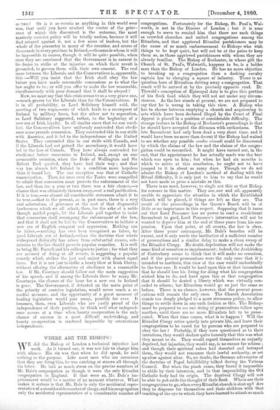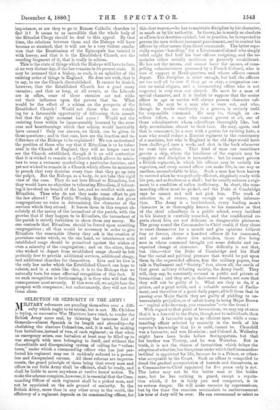WHERE ARE THE BISHOPS?
WE did the Bishop of London a technical injustice last week. As it turned out, it was not fair to charge him with silence. His sin was that when he did speak, he said nothing to the purpose. Like most men who are conscious that they are doing this, he was catching at straws all through his letter. He laid as much stress on the precise numbers of Mr. Dale's congregation as though it were the only Ritualist congregation in England. If that were go, Mr. Dale's im- prisonment would be a matter of no moment whatever. What makes it serious is that Mr. Dale is only the accidental repre- sentative of a considerable number of clergy, and his congregation only the accidental representative of a considerable number of
congregations. Fortunately for the Bishop, St. Paul's, Wal- worth, is not in the Diocese of London ; but it is near enough to serve to remind him that there are such things as crowded churches and united congregations among the Ritualists, and that aggrieved Ritualist parishioners may be the cause of as much embarrassment to Bishops who wish things to be kept quiet, but will not be at the pains to keep them so, as those aggrieved parishioners with whom they are already familiar. The Bishop of Rochester, in whose gift the Church of St. Paul's, Walworth, happens to be, is a bolder man than the Bishop of London. He has no more objection to breaking up a congregation than a dashing cavalry captain has to charging a square of infantry. There is no question here of Ritualism driving away a congregation. That result will be arrived at by the precisely opposite road. Dr. Thorold's conception of Episcopal duty is to give this portion of his flock food which they will not eat under any circum- stances. As the law stands at present, we are not prepared to say that he is wrong in taking this view. A Bishop who has to choose between emptying a church and acquiescing in acts which have been declared illegal by the Court of Final Appeal is placed in a position of considerable difficulty. The strange feature in the Bishop of Rochester's proceedings is that he should have accepted the dilemma with enthusiasm. The late Incumbent had only been dead a very short time, and it would have been no more than decent if the Bishop had waited to see whether any possible modus vivendi could be discovered by which the claims of the law and the claims of the congre- gation could be reconciled. It might have turned out, in the end, that the appointment he has actually made was the best which was open to him ; but when he had six months in which to arrive at this conclusion, he ought not to have jumped to it in about as many days. Though we do not admire the Bishop of London's method of dealing with the Ritual difficulty, it is only just to him to say that he would not have made so gross a mistake as this.
There is no need, however, to single out this or that Bishop for censure in this matter. They are, one and all, apparently unable to appreciate the situation in which the Established Church will be placed, if things are left as they are. The result of the proceedings in the Queen's Bench will be of little or no importance in this respect. Supposing that it turns out that Lord Penzance has no power to send a recalcitrant Incumbent to gaol, Lord Penzance's intervention will not be wanted to deprive him at the end of three years from his sus- pension. Upon that point, at all events, the law is clear. After three years' contumacy, Mr. Dale's benefice will be vacant, and it only needs the institution of a sufficient number of prosecutions and a similar delay to make a clean sweep of the Ritualist Clergy. No doubt, deprivation will not make the same kind of sensation as imprisonment; indeed, the Archbishop of Canterbury seems to think that it will make no sensation, and if the present prosecutions were the only ones that it is intended to institute, this view of the case would undoubtedly be the true one. It would be hard upon this or that incumbent that he should lose his living for doing what his congregation wished him to do, and hard upon this or that congregation that it should be denied a liberty which was virtually con- ceded to others ; but Ritualism would go on just the same as before. There is no chance, however, that the present prose- cutions will remain the only ones. The Church Association stands too deeply pledged to a more strenuous policy, to allow things to settle down in any such fashion as this. The Bishops must be prepared to see one string of prosecutions follow upon another' until there are no more Ritualists left to be prose- cuted. When that time comes, what is to happen ? Will the Ritualist Clergy retire quietly into private life, and leave their congregations to be cared for by parsons who are prepared to obey the law ? Probably, if they were questioned as to their intentions, they would declare quite honestly that this was what they meant to do. They would regard themselves as unjustly deprived, but injustice, they would say, is no excuse for schism ; and though their spiritual rulers had deserted and betrayed them, they would not renounce their lawful authority, or set up altar against altar. So, no doubt, the German adversaries of the doctrine of Papal Infallibility talked during the Vatican Council. But when the pinch came, they found it impossible to abide by their intention, and in that impossibility the Old Catholic body had its origin. The deprived Clergy will not be able to put aside the thought of their flock. Where are their congregations to go, when every Ritualist church is shut up? Are they to dispense for themselves and their children with that teaching of the eye to which they have learned to attach so much
importance, or are they to go to Roman Catholic churches to find it? It seems to us incredible that the whole body of the Ritualist Clergy should be deaf to this appeaL By that time, the relations between them and the Bishops will have become so strained, that it will not be a very violent conclu- sion that the Erastianism of the Episcopate has tainted it with heresy, and that it is the Established Church, not the seceding fragment of it, that is really in schism.
This is the state of things which the Bishops will have to face, at no very distant day, if the law remains in its present state. It may be assumed that a bishop, as such, is an upholder of the existing order of things in England. He does not wish, that is to say, to see the Church disestablished. It cannot be denied, however, that the Established Church has a good many enemies ; and that so long, at all events, as the Liberals are in office, some of these enemies are not with- out their influence upon the powers that be. What would be the effect of a schism on the prospects of the Established Church ? Would not those who are watch- ing for a favourable opportunity of delivering their assault feel that the right moment had come ? Would not the resisting force within be immeasurably lessened by the sore- ness and heartburnings which that schism would inevitably have caused ? Only one answer, we think, can be given to these.questions ; and in that case, how are the inaction and in- difference of the Bishops to be explained ? We can understand the position of those who say that if Ritualism is to be toler- ated in the Church of England, they will no longer care to see the Church established, though it is an odd contention that it is wicked to remain in a Church which allows its minis- ters to wear a vestment symbolizing a particular doctrine, and yet not wicked to remain in a Church which allows its ministers to preach that very doctrine every time that they go up into the pulpit. But the Bishops, as a body, do not take this rigid view of the case. They do not love Ritual or Ritualists, but they would have no objection to tolerating Ritualism, if tolerat- ing it involved no breach of the law, and no conflict with anti- Ritualists. Then why do not they make some effort to get the law altered ? The Public Worship Regulation Act gives congregations no voice in determining the character of the services which they attend. It leaves them in this respect ab- solutely at the mercy of the incumbent of the parish, with the proviso that if they happen to be Ritualists, the incumbent of the parish is strictly forbidden to show them any mercy. No one contends that Ritualism should be forced upon unwilling congregations ; all that would be necessary in order to give Ritualists the reasonable liberty they ask is the creation of provisions under which, on the one hand, no interference with established usage should be permitted against the wishes of even a minority of the congregation ; and on the other, those who wished to depart from established usage should be left perfectly free to provide additional services, additional clergy, and additional churches for themselves. Live and let live is the only law under which the Established Church can hope to subsist, and in a crisis like this it is to the Bishops that we naturally turn for some effectual
recognition of this fact. If no such recognition is forthcoming, it is they who will feel the consequences most severely. If this were all, we might face the prospect with composure ; but unfortunately, they will not feel them alone.







































 Previous page
Previous page